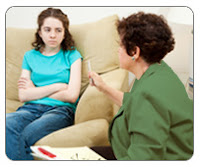An estimated seven million "typically developing" American kids have siblings with some type of “disorder” (e.g., ADHD, Autism Spectrum Disorders, depression, anxiety, etc.). These kids face many of the same challenges - and joys - as their moms and dads, but they also face other problems. Some resent the extra demands placed on them at an early age by the affected sibling, and many feel neglected by their often overburdened parents.
 Some kids say they fear "catching" their sibling's disorder. Others may wish that they, too, had a disorder so that they could get all the attention their sibling does. And many suffer embarrassment about their sibling's inappropriate behavior or abnormal appearance, and then feel guilty about it.
Some kids say they fear "catching" their sibling's disorder. Others may wish that they, too, had a disorder so that they could get all the attention their sibling does. And many suffer embarrassment about their sibling's inappropriate behavior or abnormal appearance, and then feel guilty about it.
On the other hand, some siblings welcome the early maturity and responsibility that come with having an Aspergers or high-functioning autistic (HFA) sibling. They are often well versed in the details of their sibling's behavioral traits and quirks, and they take pride in being able to explain them in sophisticated ways.
So, exactly how will your other children be affected by your "special needs" child?
That depends on how you, the parent, deal with this challenge. Your neurotypical (i.e., non-autistic) kids will take their cues from you and your husband/wife. The attitudes and actions you model will be reflected in them. They will not only project the values about their Aspergers or HFA sibling's differences within the family, they will demonstrate these beliefs in school, the community, and the world at large.
Thus, parents need to work toward setting a positive tone when first presenting their youngster's disorder to his siblings. It not only influences the quality of your immediate family relationships, but it also affects the ways in which all your kids perceive all people with differences for the rest of their lives.
Thus, parents need to work toward setting a positive tone when first presenting their youngster's disorder to his siblings. It not only influences the quality of your immediate family relationships, but it also affects the ways in which all your kids perceive all people with differences for the rest of their lives.
When you introduce the topic of autism spectrum disorders to your neurotypical kids, consider these points:
1. Allow for process time and questions.
2. Begin by highlighting the ways in which individuals are more alike than different.
3. Decide if it's best to share the information with each sibling in privacy or if it should be done with the family as a group.
4. Discuss the gifts and talents of your other kids first and then discuss those of your Aspie.
5. Discuss the ways in which the entire family is going to strive toward being more sensitive to the needs of your HFA child — needs previously unacknowledged or unrecognized.
6. Don't play the pity card — you want your children to be children and to maintain their typical relationships as siblings, not walk on eggshells.
7. Don't put unfair or unrealistic expectations on your neurotypical kids about increased responsibilities or the burden of future care-taking.
8. Emphasize autism spectrum disorders as a natural experience, and dispel fears about it being a contagious disease or something that can suddenly happen to just anyone.
9. Partner with your "special needs" child about the issue of disclosure to agree on how much or how little to reveal.
10. Talk about respecting your autistic youngster’s ownership of confidentiality, discretion, and disclosure.
11. Wherever possible, try to engage all your kids in any activities that can include them all. Are there games and routines that your entire family can engage in? This will work toward family bonding, patience and tolerance – and it will make learning fun for your Asperger's or HFA youngster.
12. The more you treat your child’s way of being as “natural” and “no big deal,” the more his neurotypical siblings will automatically pitch in, help out, and pick up the slack without thinking or complaining beyond typical sibling rivalry.
There will be occasions when your neurotypical kids require some strong parental support when they are unable to manage internal and/or external pressures.
Some pitfalls to be mindful of in observing your neurotypical children may include coping with:
- Becoming weary and worn out from constantly defending their Aspergers or HFA sibling
- Being ostracized by their friends who don't want to hang around them or come over to your house because of the affected child
- Feeling guilty when they want to go places and do things alone
- Feeling perpetually pressured to “parent” or protect their Aspergers or HFA brother/sister
- Feeling pressured by peers to reject their Aspergers or HFA brother/sister
- Mental health issues due to the stress associated with having a "special needs" sibling, especially in older daughters who may develop depression or an eating disorder
- Perceived embarrassment caused by their Aspergers or HFA sibling's behavior, especially in public
If you recognize problems in any of these areas, it will be important to have a private "family meeting" with your neurotypical kids to offer your love, praise and reassurances. Are there ways that you can compensate in partnership with them, especially if they've been feeling left out?
Be willing to admit it's true if you have unintentionally been neglectful, and plan some quality time with your them apart from the rest of the family.
Be willing to admit it's true if you have unintentionally been neglectful, and plan some quality time with your them apart from the rest of the family.
More resources for parents of children and teens with High-Functioning Autism and Asperger's:
==> How To Prevent Meltdowns and Tantrums In Children With High-Functioning Autism and Asperger's
==> Parenting System that Significantly Reduces Defiant Behavior in Teens with Aspergers and High-Functioning Autism
==> Launching Adult Children with Asperger's and High-Functioning Autism: Guide for Parents Who Want to Promote Self-Reliance
==> Teaching Social Skills and Emotion Management to Children and Teens with Asperger's and High-Functioning Autism
==> Parenting Children and Teens with High-Functioning Autism: Comprehensive Handbook
==> Unraveling The Mystery Behind Asperger's and High-Functioning Autism: Audio Book
==> Highly Effective Research-Based Parenting Strategies for Children with Asperger's and High-Functioning Autism
____________________
Do you need the advice of a professional who specializes in parenting children and teens with Autism Spectrum Disorders? Sign-up for Online Parent Coaching today.
____________________
____________________






